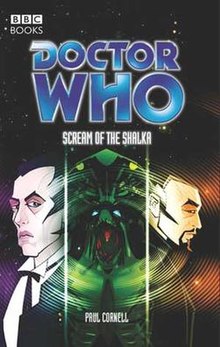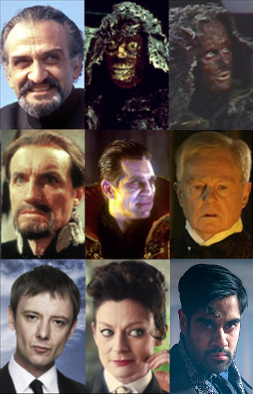
The Master, or "Missy " in their female incarnation, is a recurring character in the British science fiction television series Doctor Who and its associated spin-off works. They are a renegade alien Time Lord and the childhood friend and later enemy of the title character, the Doctor. They were most recently portrayed by Sacha Dhawan.

The Curse of Fatal Death is a Doctor Who special made specifically for the Red Nose Day charity telethon in the United Kingdom, and was originally broadcast in four parts on BBC One on 12 March 1999 under the title Doctor Who and the Curse of Fatal Death. Later home video releases are formatted as two parts and drop the "and" in the title. It follows in a long tradition of popular British television programmes producing short, light-hearted specials for such telethon events.
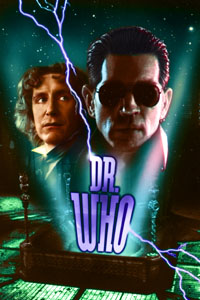
Doctor Who, also referred to as Doctor Who: The Movie or as Doctor Who: The Television Movie is a 1996 television film continuing the British science fiction television series Doctor Who. It was developed as a co-production between Universal Studios and BBC Worldwide. It premiered on 12 May 1996 on CITV in Edmonton, Alberta, Canada, 15 days before its first showing in the United Kingdom on BBC One and two days before being broadcast in the United States on Fox. It was also shown in some countries for a limited time in cinemas.
Doctor Who spin-offs refers to material created outside of, but related to, the long-running British science fiction television series Doctor Who.
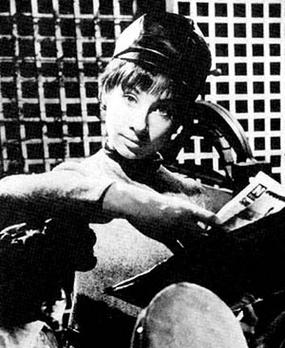
Susan Foreman is a fictional character in the British science fiction television series Doctor Who. The granddaughter of the Doctor and original companion of their first incarnation, she was played by actress Carole Ann Ford from 1963 to 1964, in the show's first season and the first two stories of the second season. Ford reprised the role for the feature-length 20th anniversary episode The Five Doctors (1983) and the 30th anniversary charity special Dimensions in Time (1993).
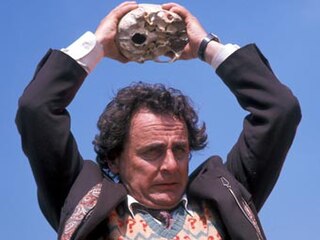
Survival is the final serial of the 26th season of the British science fiction television series Doctor Who, which was first broadcast in three weekly parts on BBC1 from 22 November to 6 December 1989. It is the final story of the original 26-year run; the show did not return as a series until 2005. The story marks the final regular television appearances of Sylvester McCoy as the Seventh Doctor and Sophie Aldred as Ace, and the final television appearance of Anthony Ainley as the Master, appearing alongside McCoy's Doctor for the only time.

Victoria Waterfield is a fictional character played by Deborah Watling in the long-running British science fiction television series Doctor Who. A native of Victorian England, she was a companion of the Second Doctor and a regular in the programme from 1967 to 1968. Only two complete serials to feature her exist complete in the BBC archives. However, DVDs of all her adventures have still seen release, with both official animation and photo reconstructions utilizing the original surviving audio taking the place of the missing episodes.

Destrii, or the Primatrix Destriianatos, is a fictional character who appeared in the Doctor Who Magazine comic strip based on the long-running British science fiction television series Doctor Who. She was a companion of the Eighth Doctor.
The Visitation is the fourth serial of the 19th season of the British science fiction television series Doctor Who. It was first broadcast in four twice-weekly parts on BBC1 from 15 to 23 February 1982.
Colony in Space is the fourth serial of the eighth season of the British science fiction television series Doctor Who, which was first broadcast in six weekly parts on BBC1 from 10 April to 15 May 1971.
The Past Doctor Adventures were a series of spin-off novels based on the long running BBC science fiction television series Doctor Who and published under the BBC Books imprint. For most of their existence, they were published side-by-side with the Eighth Doctor Adventures. The novels regularly featured the First through Seventh Doctors. The Infinity Doctors had an ambiguous place in continuity and featured an unidentified incarnation of the Doctor. The Eighth Doctor co-starred with the Fourth Doctor in one novel (Wolfsbane) and, after the Eighth Doctor Adventures had ceased publication, a novel featuring the Eighth Doctor and set between two earlier Eighth Doctor Adventures was published within the Past Doctor series.
The Invasion is the partly missing third serial of the sixth season of the British science fiction television series Doctor Who, which was first broadcast in eight weekly parts from 2 November to 21 December 1968.
The Sea Devils is the third serial of the ninth season of the long-running British science fiction television series Doctor Who, which was first broadcast in six weekly parts on BBC1 from 26 February to 1 April 1972. It was written by Malcolm Hulke and directed by Michael E. Briant. The serial is notable as the first appearance of the Sea Devils and features extensive location filming in cooperation with the Royal Navy, as well as an experimental electronic score by Malcolm Clarke.
"Utopia" is the eleventh episode of the third series of the revived British science fiction television series Doctor Who. It was broadcast on BBC One on 16 June 2007. It is the first of three episodes that form a linked narrative, followed by "The Sound of Drums" and "Last of the Time Lords". The episode serves to re-introduce the Master, a Time Lord villain of the show's original run who last appeared in the 1996 television movie Doctor Who.
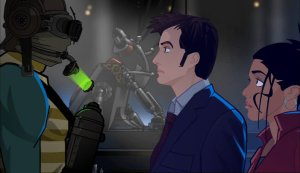
The Infinite Quest is an animated serial based on the British science fiction television series Doctor Who. It was made by BBC Television, but does not share the same producers as the live-action series. It was aired in twelve weekly parts starting 2 April 2007 as a segment of the children's spin-off show Totally Doctor Who. The final instalment was shown at the end of the "Omnibus" episode, thus increasing the total to thirteen parts, making the compiled series the equivalent length of a standard episode of Doctor Who. The compiled story was broadcast on 30 June 2007, coinciding with the finale of Series 3.

The Gallifrey Chronicles is a BBC Books original novel written by Lance Parkin and based on the long-running British science fiction television series Doctor Who. It was the last of the Eighth Doctor Adventures range and features the Eighth Doctor, Fitz Kreiner, and Trix MacMillan. This book, along with a few others in the series, was reprinted in 2011 and is available as an e-book.
"The Beast Below" is the second episode of the fifth series of the British science fiction television series Doctor Who. It was written by executive producer and head writer Steven Moffat and broadcast on BBC One and BBC HD on 10 April 2010.

The Ninth Doctor is an incarnation of the Doctor, the protagonist of the British science fiction television series Doctor Who. He is portrayed by Christopher Eccleston during the first series of the show's revival in 2005.
